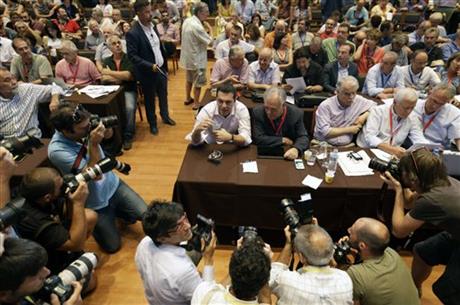Greek bailout talks to shift gear
ATHENS: Lead negotiators from the European Union and International Monetary Fund began an intensive round of talks with Greece on Friday to hammer out details of a third international bailout worth some 85 billion euros ($93 billion).
The envoys held a first meeting with Finance Minister Euclid Tsakalotos following talks during the week in Athens between lower-level officials on reforming the tax system and labor market regulations.
The bailout talks must be concluded before Aug. 20, when a debt repayment to the European Central Bank worth more than 3 billion euros is due.
Tsakalotos was accompanied by Economy Minister Giorgos Stathakis at the meeting with officials from the IMF, European Commission, European Central Bank and European Stability Mechanism.
It comes hours after Prime Minister Alexis Tsipras defeated a bid by dissenters in his left-wing Syriza party to push for an end to bailout negotiations and seek a return to the old national currency, the drachma.
The party's governing central committee early Friday backed a proposal by Tsipras to hold an emergency party conference in September, after the talks have been concluded.
Dissenters had sought a conference earlier, pressing the government to abandon the negotiations.
Tsipras effectively lost his majority in parliament in a vote three weeks ago, when nearly one-fourth of Syriza's lawmakers refused to back new austerity measures. Pro-European Union opposition parties were left to save the bill and have continued to prop up his government.
"We have to agree that we can't go on this way," Tsipras told the committee members during a dramatic 12-hour meeting. He added that "the absurdity of this strange and unprecedented dualism" within the party must stop.
Far-left dissenters argue that Syriza has abandoned its principles over the past six months under the country's popular prime minister. They have openly voiced support for Greece to turn its back on the euro as its national currency.
"This country no long has democracy, but a peculiar type of totalitarianism — a dictatorship of the euro," prominent dissenter Panagiotis Lafazanis said.
The third bailout will include a new punishing round of austerity measures heaped on a country reeling from a six-year recession and more than 25 percent unemployment.
Also on Friday, Tsipras is due to appear in parliament to answer questions from the opposition about contingency plans to adopt a parallel payment system that could have facilitated a euro exit.






